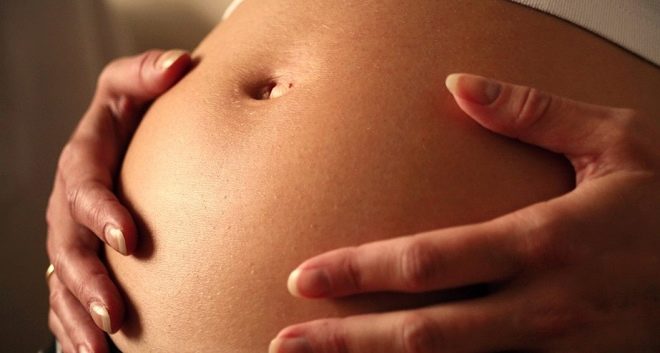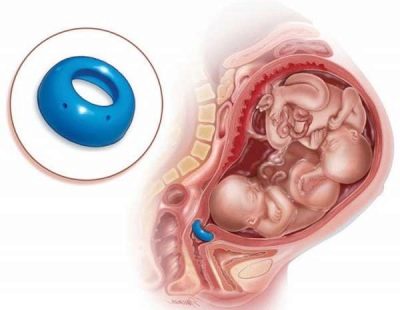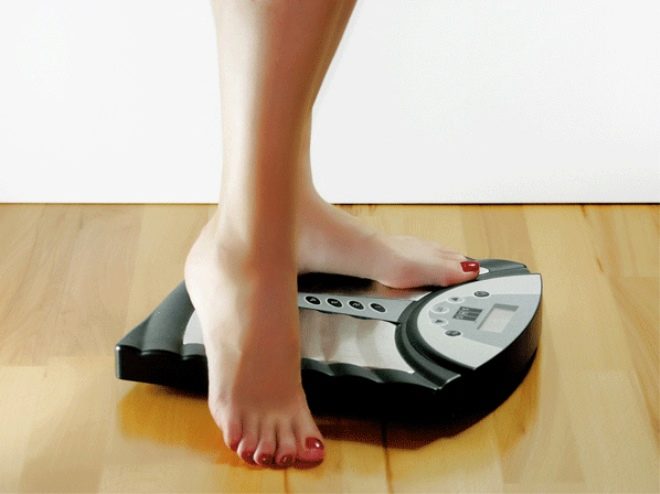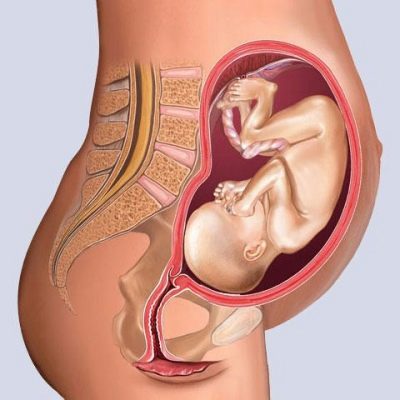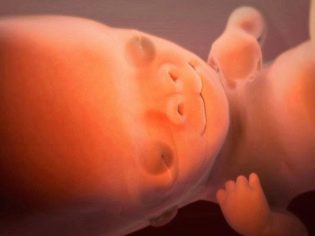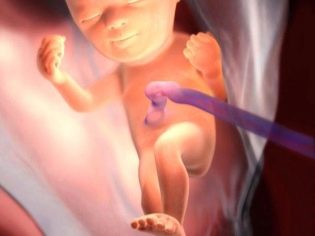24 week of pregnancy: what happens to the fetus and the expectant mother?
24 week is rapidly approaching the end of the second trimester of pregnancy. This means that the state of health will remain relatively light and not burdensome for a very short time. That is why on this period it is important to complete all the important things that require physical effort from a woman. A lot of interesting things happen to the baby too. More we will tell in this article.
How many months is it
Until the end of the second trimester, there are only two weeks and a few days. The 24th obstetric week means that 22 weeks have gone from conception, and almost 20 weeks have passed since the delay and the first joy caused by the “striped” test. 23-24 week completes the full sixth lunar month of pregnancy. In calendar terms, it took five and a half months.
Now a woman can safely say that she has traveled more than half of this responsible and difficult path. The beginning of 24 weeks means that in six days the seventh month of pregnancy will begin, about 16 weeks separate the woman from childbirth.
Feelings of the future mother
Nature makes a generous gift for pregnant women, giving them the opportunity to feel good and look great on this period. In the third trimester, everything will not be so rosy, and therefore the allotted time should be used to the maximum and with benefit. While the woman feels a surge of strength, and fatigue can manifest itself only occasionally, mostly towards the evening after the work day. The future mother continues to work, study, do her usual daily activities. And her feelings are now bright, unforgettable.
Fetal movements
The experience of the perturbations of the baby, which all pregnant women now experience, is invaluable. Many women admit that even many years after giving birth, they sometimes experience them again in their sleep. The "memory" of the body forever captures these exciting impressions. The movements of primiparas, and those with a second or third pregnancy, are now moving.
Every day the sensations become more vivid and distinct, some of the expectant mothers claim that the baby sometimes kicks so hard that it hurts.
The lack of movement at this time needs careful diagnosis and is not considered normal.
From the 24th week, the baby uses perturbations as a peculiar language of communication with the mother. Through the movements, he can report that he is doing well and that he feels bad. A certain regularity and cyclical nature of the fetal motor activity appears. If mother carefully listens to her feelings, she will understand that the crumbs already have their daily routine and regime. About 18-20 hours a day, he sleeps, or rather is in a state that is very close to sleep mechanisms. At other times, the baby is awake.
Strengthening the motor activity of the crumb responds to the emotional state of his mother, as well as her food, fatigue. At night in this period, most babies become more active.During the day, the mothers lull them to sleep, but at night, when the stomach does not sway to the rhythm of the steps, there is real freedom for the little explorers: the babies start to play, roll over, which can cause sleep disorders in a pregnant woman, because in a relaxed state the woman's sensitivity increases and even baby movement perceived much brighter.
Already the temperament of the child becomes clear: some kids are active and vigorous, others are more lazy, drowsy and slow. They will remain so after their birth. It is not necessary to count the movements for an hour, 10 hours or days now. But it is high time to learn how to fix them mentally, because soon, at about week 28, the doctor will definitely suggest starting to count the activity episodes.
Pains
The body of a pregnant woman is already beginning to prepare for the upcoming childbirth, and it is precisely with this that many pains that women experience at week 24 are associated. Despite the fact that there are as many as 4 obstetric months left until the birth, the pelvic bones begin to gradually become softer and more pliable, they are more mobile. This is what can cause complaints that the pubic bone hurts.
This pain is quite tolerable, most often it appears when trying to get up from a sitting position and when turning from the right side to the left and vice versa, as well as when walking for a long time or having to stand for a long time.
To exclude the development of symphysitis, you should definitely talk about the problem with your doctor.
The loin on the 24th week hurts and pulls due to the fact that the ligamentous apparatus, which holds the large uterus, stretches and becomes more dense, the load on the lower back and the sacrum, as well as on the back, increases significantly. The back also hurts due to the fact that the center of gravity has shifted, and now the back muscles are more tense so that the woman’s body can be in balance.
Such pains are considered a variant of the norm, they should not inspire serious fears and anxieties. However, there are other pain sensations. If the uterus has come to a tone, there were growing pains, cramping, encircling, then it is impossible to delay it - you need to call an Ambulance.
Pricking and short-term sharp "lumbago" in the area of the uterus can talk about pinching nerve endings. To solve the problem will help change the posture, a little rest. On headaches at 24 weeks should pay special attention. If in the first trimester they were private companions of a woman due to the action of large doses of progesterone, now, when the hormonal balance has come to a certain balance, the head hurts much less. If complaints persist, you should pay attention to the level of blood pressure, perhaps it is high or low.
It is natural for the end of the sixth month of pregnancy are pain in the legs. My knees and feet hurt the most. This pain is caused by the load on the lower limbs, which is growing every day, because the woman herself is gaining weight, and the baby inside her is growing.
Now it is important to prevent varicose veins, wear special stockings, and also wear comfortable and stable shoes.
Allotment
Vaginal discharge at week 24 can give a woman a lot of anxiety, because their number increases. There is nothing unusual in this fact itself - this mechanism is triggered by the organism itself so that the microflora of the genital tract remains normal. Normal are the discharge light and uniform, odorless or with a slight sour smell.
The amount of discharge will cease to disturb if a woman uses thin hygienic panty liners. Tampons should not be used: the accumulation of vaginal secretions inside the vagina creates fertile ground for the reproduction of bacteria, which in turn can get there from the hands when the tampon is inserted.Also, a sanitary pad (you can use special pads for pregnant women) will help control the color and composition of secretions, in time to pay attention to changes.
If the discharge has become frothy, non-uniform, with flocculent impurities, has changed color, an unpleasant smell has appeared and, possibly, the accompanying itching in the perineum, it is necessary to consult a doctor. Such secretions are most often a manifestation of an infectious disease.
Watery discharge with a very unpleasant odor can be a manifestation of bacterial vaginosis, white cheesy discharge with itching is thrush, white plaque on the walls of the vaginalis and external genitals is a sign of a fungal infection, and green secretions suggest the presence of a purulent inflammatory process.
Waterless, odorless discharge may be a symptom of water withdrawal or partial leakage, and the bloody, brown and pink discharge indicates that there is blood impurity in the vaginal secretions; this can be very dangerous, and urgent medical care is required.
Given the increase in the amount of discharge, a woman should pay more attention to personal intimate hygiene, rinse two or three times a day, while you should not get involved in the use of soap, its alkaline components can lead to pathological dryness in the perineum.
Psychological state
A quite noticeable and noticeable others jump in the weight of a woman often causes her to feel inferior, she can begin to be ashamed of her own naked body, and this clearly does not improve relations between spouses.
Psychologists who work with pregnant women recommend switching attention from a plump waist to beautiful hair and legs, to shining eyes and smoother and cleaner skin. Nature generously compensates a pregnant woman for what she temporarily deprives. Now the woman looks very attractive.
Many pregnant women in the 24th week receive a lot of ideas on rebuilding the house, repairing the future nursery, buying a dowry for the baby. It is desirable that the rest of the family approve and support such initiatives. This is how the “nesting instinct” manifests itself, which will become even more pronounced a few days before giving birth.
The woman now needs the understanding, support and participation of the future pope. Men, even if they are very busy at work and are doing everything so that the family, which will soon grow, does not need anything, you should know about it. Therefore, do not be shy, it is worth telling about your feelings everything as it really is.
Not so often, but at this time there are pregnant women who have not yet had the experiences of the first trimester with all the “hormonal” emotions. If there is irritability, resentment and tearfulness, if a woman, no matter how hard she tries, cannot calm down anger attacks, the scandals in the family become more frequent, you should definitely contact a psychologist. Such specialists accept future mothers in any antenatal clinic for free.
Week 24 is an excellent time to establish good and strong family relationships, to create a "groundwork" for the future. Now a woman has increased libido, sexual appetites and desires are on top. A man will definitely appreciate it. Physical proximity and confidential communication will help the couple to understand all the misunderstandings.
Changes in the body
Increased fatigue is now associated not so much with the fact that the tummy has become heavy to wear, but with the fact that the immunity of the woman is lowered. Changes in it no longer leave any reason for speculation: the tummy is rather large, it is already impossible to hide it. What other metamorphoses occur this week, let's look at in more detail.
Uterus size
The uterus stretches and continues to grow every day. She is now 4-5 centimeters above the navel line.Its location is such that the bottom of the uterus does not yet reach the lower line of the breast, but is already close to it. The height of standing of the uterus floor is on average 24 centimeters, variations from 22 to 26 centimeters are possible.
The woman clearly feels the uterus when trying to bend, as well as with increased tone of the uterine smooth muscles.
The muscles of the uterus are very elastic, and this allows it to stretch, increasing to approximately 500 times in 9 months of pregnancy.
The average length of the cervix in this period is 40 mm, however, it is possible to slightly decrease it to 35 mm
With more intensive smoothing and shortening, a diagnosis of isthmic-cervical insufficiency is made, and the woman is recommended to wear an obstetric pessary to prevent preterm birth. Short neck creates high risks of just such an outcome of events.
Weight gain
Weight gain from 24 weeks becomes more intense, a woman’s own weight is growing by leaps and bounds, and this is already quite well felt. Now a woman can recruit 500 grams per week, and this is much faster than in the first trimester. Right now you should be more attentive to your body weight, in order to prevent overweight, which can complicate the course of pregnancy, childbirth and the postpartum period.
Speaking about the general increase, you should consider the constitution and the physique of a pregnant woman. If before conception she was very thin, with a clear deficit of body weight, then by the 24th week the rate of increase for such a future mother is about 8 kilograms. Women with a normal weight before pregnancy by this time can add 7 pounds or less, and expectant mothers with overweight and obesity can add no more than 4 pounds plus the original weight.
Weigh yourself every day is not worth it. Weekly weighing will be more informative. At the same time, it should be carried out on the same day, for example, on Friday or Monday, in the same clothes or without it, after visiting the toilet in the morning.
The data should be recorded in a notebook along with other observations of your condition, then to show your notes to the doctor. This will help him better understand what is happening in the body of the future mother.
Skin and stretch marks
Pregnant skin becomes drier than before. Now it is more vulnerable, special attention should be paid to hygiene issues. You should not experiment with unfamiliar new cosmetics: it can cause an allergic reaction. Also, do not visit the solarium and sunbathe under the open sun - the skin is now extremely sensitive to ultraviolet radiation.
Increased pigmentation - the formation of spots and freckles on the shoulders, chest, back, arms and face - is not excluded. In this phenomenon, pigment melatonin is “guilty”, the production of which is now being activated.
These pigment spots do not need treatment, they usually pass spontaneously some time after birth.
Stretch marks (stretch marks) - an unpleasant phenomenon, but almost inevitable, because the skin is strongly stretched. Under mechanical action, the fibers of elastin and collagen are torn, replacing connective tissue appears in their place. The greater and more intense weight gain, the more visible and numerous stretch marks can be in a woman.
Over-tension of the skin at the current time may cause an itchy sensation in the abdomen, thighs, as well as in the lower and lateral parts of the mammary glands.
Chest
The mammary glands in size have practically reached their maximum. Further growth will be almost imperceptible, because now the internal processes that are imperceptible to the eye are going on in the breast — the ductal tissue is being prepared for lactation, the glandular tissue is compacted.
Some pregnant women are already beginning to produce colostrum. It is a nourishing fluid that precedes breast milk.Those who are going to give birth for the first time may not have colostrum, because their ducts are narrower and their nipples are “strong”. Those who had breastfed earlier were more likely to use special bra inserts to protect clothes from the appearance of stains.
The colostrum itself is thick and yellowish. The closer to childbirth, the more liquid it will become, its color will become more transparent. The nutrient is a very suitable environment for the breeding of pathogenic bacteria, so a woman needs to monitor her breast condition, wash her twice a day with warm water, wear a comfortable cotton bra with wide straps and supporting cups.
Training bouts
False contractions, which are popularly called training, and in the medical community, Braxton Hicks fights, at week 24 can appear mostly only in primiparous women. In future moms “with experience,” the uterine muscles begin to contract closer to childbirth, a few weeks or even days before the expected day of birth.
A woman already feels good uterus and can accurately determine her tone. During a training bout, the musculature of this organ is slightly stiffened and remains in tension for some time, after which the uterus becomes soft again. Such contractions do not contribute to the disclosure of the cervix, are not dangerous. They repeat infrequently and quickly, if a woman changes her body position, lies down or walks, takes a warm shower.
Scientists do not reliably know why and why Braxton-Hicks contractions occur, but it is believed that this is how the main female reproductive organ begins to prepare for the upcoming labor.
Despite the fact that such contractions are considered physiological and normal, a woman should definitely tell her doctor that she has training contractions of her uterus muscles.
Other changes
A woman in the 24th week of pregnancy may again begin to often run to the toilet for small needs. Frequent urination is a consequence of the pressure of the uterus on the bladder.
Other organs that were previously quite comfortably located in the abdominal cavity also had to “move over”. Thus, the pressure of the uterus on the stomach from below causes heartburn, since gastric juice is thrown into the esophagus, and the pinned gallbladder “rebels” with a violation of bile excretion, which affects digestion - diarrhea and nausea can occur.
The pressure on the intestinal loops, already pushed back to the back, causes constipation. This problem is faced by every second expectant mother at the end of the second trimester. In turn, difficulties with defecation dozens of times increase the likelihood of hemorrhoids.
At six months of pregnancy again, as at the very beginning, the risk of fainting and short-term loss of consciousness increases. The head is spinning most often due to drops in blood pressure. The increase in blood volume causes rapid heartbeat, and the pressure of the uterus on the diaphragm - shortness of breath.
At 24 weeks, a woman can still be chased by a physiological rhinitis associated with the swelling of the mucous membranes of the nasal passages. Allergic rhinitis and cough may appear in this period in women prone to allergies, as well as dermatological problems associated with allergies.
Fetal development
In the embryonic period, the growth of different children proceeded at approximately the same speed. Week 24 is a solid period in which the differences in the development of different babies begin to appear clearly. Some inherited from their parents big growth, others - small, some have already beaten all records, while others remain thin. Therefore, now it becomes more difficult to compare the height and weight of the fetus with the norms.
Nevertheless, there are average "standards".According to them, at 24 weeks old, the baby reaches a height of 30-31 centimeters from the crown to the heels, about 27 cm from the tailbone to the crown (CTE), and its weight approaches 600 grams.
Observant pregnant women who check the calendars of fetal development each week may notice that the growth rate of the child slowed down, but he began to gain weight very quickly. This is the main feature of the development of crumbs at the end of the second trimester.
Appearance
Now the baby looks exactly as it will at birth with one exception: by the time of birth, he will no longer be thin. But the facial features and features of the appearance are already fully formed, it is quite clear who the crumb looks like. The eyes still look very large, but this subjective feeling is generated by his overall thinness.
In recent weeks, the child has recovered significantly. Subcutaneous fat, which is formed now, begins to be deposited. While it is most in the lumbar region, neck, on the cheeks. The arms and legs, which have already grown to quite normal proportions, are gradually recovering. The baby no longer looks like an embryo with short legs, a big head and long arms. Now his body is more proportional, although his head still has to somewhat decrease compared to the rest of the body.
Subcutaneous fat is needed not only for the fruit to become beautiful, although the fact that the skin has ceased to be saturated with red and numerous wrinkles and folds are gradually smoothed out is good news. Subcutaneous fatty tissue will need crumbs after birth: it will help him to adapt to this world, which is much colder than in the womb, because it has thermo-saving functions.
The body of the baby is covered with original lubricant, which is a mixture of secretion of sebaceous glands with particles of the epidermis, as well as glycogen. It reliably protects the skin of the crumbs from the constant exposure to the aquatic environment. Most of it is on the face, on the eyebrows, on the ears, on the back and in all the folds. Lubrication is not washed off with water, not only because of the density, but also because of the hair holding it - lanugo.
At week 24 begins the gradual loss of these light and very thin original hair. Baby should get rid of them completely to the genera. But sometimes babies appear with the remains of lanugo on the body, and there is nothing terrible in it: hair will fall out during the first weeks of independent living.
Nervous system
The formation of the cerebral cortex continues. New grooves and gyrus appear almost every day. Simultaneously with the formation of the layers of the cortex, active development of young neurons and the establishment of new neural connections continue. Can safely say that Every day in the arsenal of your baby some new movement or skill appears.
At 24 weeks, the baby is able to grab not what came into reach, but what he wants to grab, for example, the umbilical cord or his own leg. The kid no problem conveys the hand to the mouth, if you want to suck the cam, and even now the left-handed children do everything with their left hand, and her fingers often suck. Right-handed people prefer the right hand in the mother's womb.
If something touches the baby’s palms or feet, the crumb shows tendon reflexes - it spreads out fingers like a fan. And if something touches the lower part of his body, then he involuntarily bends, trying to close.
This week, the kid demonstrates cervical tonic reflexes of the situation: if he turns his head to the right side and slightly tilts it, then the right-hand cam is released.
This week, the baby has dreams, and the phases of fast and slow sleep alternate just like in adults. If certain skin areas are irritated, the baby makes breathing movements. The full formation of such reflexes, allowing the crumbs to survive, to breathe on their own, is completed by the 27th week of pregnancy.
Internal organs
In the body of the baby everything works like a clock. Internal organs are fully formed, now they are growing. The heart has increased in size, it pumps up to 25 liters of blood per day. The heart rate now is normally 148-178 beats per minute.
The digestive system debugs the interaction of all organs in it included. The stomach takes the amniotic fluid, which the baby swallows, the gallbladder produces bile, and the intestines contract rhythmically. It began to accumulate first cal - meconium. It is due to bile entering the intestine, which is dark green, almost black in color and consists of epithelial particles and lanugo, which with the waters enter the stomach.
The urine is produced by the kidneys, and the bladder accumulates. The kid pees about once an hour, but the sterility of the amniotic fluid is not disturbed, because the water is updated every three hours. In boys, the testicles descend into the scrotum, in girls, the reproductive system organs have long been located in their places.
The main event of this week is the beginning of the production of surfactant. This is a special substance that prevents the alveoli of the lungs from sticking together. It will help the lungs to open up after the birth of the crumbs, to breathe independently.
While the lungs are still immature, surfactant is small, but the process has already begun - the chances of survival in the case of premature birth will increase every day.
Sex determination
Since the external genital organs are already fully formed, the diagnosis of the sex of the child is not labor. If it was not possible to find out before 24 weeks, now it is worth going to an ultrasound, because very soon the fetus will become so large that he will have to take a position that is inconvenient for studying sex differences: he will bend, hold legs and hands, and close his genitals.
The accuracy of determining the sex on the ultrasound at the current time is considered one of the highest for the entire period of carrying a baby. The main condition is the desire of the child himself to show his genitals. Some crumbs turn away from the ultrasound transducer.
Viability of the fetus
If childbirth begins on the 24th week, the child has a chance to survive. And compared with the previous week, they increase slightly. Thanks to the achievements of medicine, doctors manage to save about 10-12% of children born on the 24th week.
Such babies have almost no reserves of subcutaneous tissue, the nervous system has not completed its formation, not all reflexes necessary for survival are present. And because among the survivors a very high percentage of children with disabilities. Most often, the birth at such an early date is fraught with total dysfunction of the central nervous system, visual and auditory function, mental development.
Of course, there are exceptions, but there are few cases of successful outcomes when giving birth at week 24 did not affect the health of a rescued baby in the future.
Your baby on ultrasound
If the screening of the second trimester is passed, but there is no special need for an ultrasound scan at week 24. Of course, no one forbids a woman to go to the ultrasound room and voluntarily to determine the sex of the child, if this has not been done before.
In addition, the doctor may have more compelling reasons for an unscheduled ultrasound, for example, pregnancy complications: the appearance of pain and atypical discharge from the genitals, a decrease or increase in motor activity of the baby. Anyway experts will re-identify all sizes that can provide a lot of useful information about the development of the little ones.
These dimensions are called fetometry, and 24 weeks are characterized by such values.
Table of fetal fetal standards in the 23-24 week of pregnancy
BPR, mm | LZR, mm | DBK, mm | The length of the bones of the tibia, mm | Shoulder length, mm | Forearm length, mm | Head circumference, mm | Abdominal circumference, mm |
56-66 | 70-85 | 40-46 | 37-45 | 36-44 | 33-38 | 200-240 | 170-230 |
Hazards and Risks
As in any other gestational age, a woman can be within two steps of a dangerous situation.Now the safety of the baby and the future mother's health may be threatened by the following.
Preterm labor
Considering that the consequences of preterm labor in the current term may be unpredictable, we should avoid the onset of labor activity by all means. The risks of premature birth are higher in women with isthmic-cervical insufficiency, since the growing fetus is now pressing harder and harder on the weak and untenable cervix.
Such pregnant women are usually advised to continue taking Utrozhestan.
Other expectant mothers who were under increased supervision due to the threat of miscarriage in the first trimester, this drug is usually canceled after 18 weeks.
The risks of premature birth are considered to be quite high in women with preeclampsia, overweight, in women who have twins or triplets, in pregnant women who have bad habits - smoking or drinking alcohol. Doctors say that there is a hereditary pattern: if a woman herself appeared prematurely once, then her probability of giving birth before the planned obstetric period is higher than that of the others.
If the expectant mother is at risk, then surely she already knows about it from the doctor. But also those whose pregnancy is smooth and cloudless, you should not relax. Only careful attention to yourself will help save the child and extend the period of gestation. It is impossible to lift weights, stresses, strong emotional experiences, uncontrolled intake of medicines can be dangerous for a woman.
The first symptoms of beginning labor at this time are the same as in full-term pregnancy: abnormal discharge from the genitals or rupture of amniotic fluid, increasing contractions, severe persistent back pain, hypertonia of the uterus.
The sooner a woman turns to an ambulance, the better, because in some cases, you can stop the birth process with medication if the fetal membranes are intact and the placenta has not suffered.
Infectious and non-communicable diseases
Immunity of women at week 24 is in a very poor condition. It is reduced, because the entire first trimester was suppressed by the hormone progesterone. Such immunosuppression was a necessary measure: a strong and “trained” immunity of the pregnant woman could reject the crumb only because half of its genetic set is alien to the mother’s body, it is the father’s genetic material.
Now, when the threat of immune rejection is practically absent, immunity is suppressed so much that it becomes difficult for a woman to resist even simple viruses and bacteria. It is now more than ever before that there is a high probability of contracting influenza and ARVI, as well as other infectious diseases.
Often gives to know about yourself and the most common cold. Prevention measures are not always effective. If the pregnant woman is sick at the current time, it is important to avoid self-medication. She needs to call a doctor at home, show him her exchange card with analyzes. The doctor will tell you that from a drug to a woman in an “interesting position” you can take, and what not.
The consequences of the cold are not so terrible at the end of the second trimester, as the attempts of women to recover on their own. Sometimes the expectant mother refuses all medicines. If you have a sore throat and a sore throat has begun, it is fraught with serious complications, there is no need to do without antibiotics. Some antibacterial drugs for pregnant women are allowed, for example, "AmoxicillinOr Flemoxin. And at high temperatures, antipyretic drugs such as "Nurofen" or "Paracetamol».
At the other extreme, attempts to take drugs without a prescription. This is dangerous because many drugs are teratogenic (affecting the development of the fetus).
Exacerbation of chronic diseases
Against the background of reduced immunity and increased stress on all organs and systems of a pregnant woman, the probability of exacerbation of chronic diseases significantly increases. If earlier the future mother suffered from one of these ailments, right now you need to pay special attention to your health. At week 24, colitis and peptic ulcer disease are often exacerbated, and stomach aches due to gastritis, which last time made itself felt in the distant school years.
Many manifest inflammatory diseases of the urinary system - cystitis. Problems may also occur in women with chronic problems with the joints, the spine.
If there were previously chronic diseases, a woman should visit a specialized doctor right now to be examined for possible manifestation of the ailment and get recommendations.
Gestosis
At the 24th week of pregnancy, preeclampsia may not manifest at all, and may be quite noticeable. Its symptoms are as follows: swelling, increased blood pressure, the presence of protein in the urine of a pregnant woman. In its extreme manifestation, preeclampsia may be accompanied by convulsions (eclampsia).
The causes of this complication, which can be fatal for both women and fetuses, have not yet been fully studied. There are only theoretical assumptions. According to them, preeclampsia can develop in a woman experiencing chronic prolonged stress in a woman with hormonal disorders.
Also, the likelihood of developing preeclampsia can be inherited by an autosomal recessive principle (from mother to daughter). Common causes include vitamin B and folic acid deficiencies, as well as problems with the uteroplacental bloodstream.
A woman should be more attentive to her well-being, consult a doctor if even minor edemas appear, as well as in case of sudden weight gain: this may be a sign of internal edemas that are not visually visible.
Analyzes and surveys
Since the second prenatal screening was left behind, at 24 weeks a woman passes on a mandatory basis only one test - a general urinalysis. It is necessary so that the doctor can see how the future mom's kidneys cope with the increased load, whether the protein, the “companion” of preeclampsia, has appeared in the urine. The analysis must be taken a couple of days before the scheduled appointment.
If a woman had not donated blood for syphilis the week before, she would need to have her blood test taken at week 24. This disease is very insidious. It is not always sexually transmitted, and it is not always possible to detect it when registering during a large diagnostic campaign. The incubation period of the disease is large, so it is advisable to donate blood for RV at least 3-4 times over the entire period of the child's birth.
Women who have Rh negative blood at 24 weeks are usually prescribed a blood test for the presence of specific antibodies to fetal blood cells.
Recommendations to expectant mothers
Compliance with simple and effective recommendations this week will help avoid trouble and complications in the process of gestation. As he was born, as we found out, it is still too early, mothers are required to be diligent and responsible. At 24 weeks you need to pay attention to the following aspects of life.
Sex
Sex at 24 weeks gestation is not prohibited and is even recommended if there are no obvious contraindications: the presence of an obstetric pessary for isthmic-cervical insufficiency, the presence of surgical sutures on the cervix of the uterus imposed earlier, as well as other pathologies of pregnancy that represent the onset of early delivery .
Intense blood supply to the genitals causes a woman to have a strong sexual desire. But the spouses in no case should not forget about caution. Now you need to choose a safer posture that eliminates pressure on the uterus, as well as deep penetrations.
If atypical discharge after sex appears, be sure to consult a doctor.
Clothes and shoes
All women's shoes should now be flat. Wearing high heels disrupts the blood circulation of the pelvis, lymph flow, and also creates the risk of loss of balance, because the center of gravity is now heavily biased. If the usual shoes, which were fit, began to rub his legs and reap, this can be a sign of the appearance of edema.
Clothes should be selected spacious, not squeezing the abdomen and thighs, made exclusively from natural fabrics. A woman in six months of pregnancy sweats harder, synthetics and semi-synthetics can cause a violation of thermoregulation, overheating and cause a lot of hygiene problems.
Nutrition
Noticing that the weight starts to arrive faster, some pregnant women at week 24 try to go on a diet. Do not do this if the total weight gain does not exceed the norm. The need for calories is now growing, and therefore it would be wiser to increase the calorie content of dishes by about 500 Kcal per day.
Fried, smoked, spicy, carbonated drinks should still be avoided. About a third of the entire diet of a pregnant woman should be raw vegetables and fruits, which contain rough fiber, necessary for the prevention of constipation. Also, do not forget about foods rich in calcium and iron, because the risk of anemia is now quite large. These products include buckwheat porridge, red meat, beef liver, nuts.
Courses for pregnant women
Courses for future mothers work with each female consultation. And now is a great time to start attending classes. Doctors will talk about the nuances of the course of pregnancy, help you properly prepare for childbirth, teach gymnastics and show breathing exercises. Primipara women will get a lot of useful information about the care of a newborn.
You can attend classes with your husband, the future father will also be able to learn many new and interesting things in the classroom. In addition to theoretical information, a woman will be able to ask doctors and psychologists all her questions of interest.
The courses will help to cope with the depression of pregnant women, suggest which bandage is better to choose for wearing before giving birth, and which one will help to get back in good shape after them faster.
Attention - baby
Many mothers at this time without any difficulty determine the position of their baby in the tummy: if the movement is below, then a crumb in the head previa, if at the top - in the pelvic. You can also understand where the crumb is turned, where his butt is - in the right or left side. The kid distinguishes sounds well and loves his mother's voice very much. All this should be the main to establish contact with the crumbs now.
Do not forget to read him fairy tales and sing songs, stroke his tummy. The baby feels well if he is desired, loved. It is precisely now, according to perinatal psychologists, that his future worldview is shaping - optimism or pessimism in relation to the surrounding world.
Reviews future moms
Many future mothers, who have kept their testimonials about the 24th week of pregnancy on the Internet for history, say that their condition has become somewhat unstable: in the morning they are full of strength and energy, and in the evening they fall down from exhaustion. But the mood has improved markedly - the hormones progesterone and hCG are no longer so much "annoy" a pregnant woman.
Many in the 24th week they decide to use the time and time that they did not demand, in order to spend the remaining time before going on maternity leave more quietly, having the opportunity at any time to lie down, relax or go for a walk.
The question of choosing a name for an unborn child is still acute for many couples, and therefore women decide to post “ballots” in their blogs, in which they invite readers and friends to vote for several choices of names for boys and girls. If family disputes are at an impasse, you can follow their example and show the results of the popular vote to their relatives.
About what happens to the fetus and the future mother in the 24th week of pregnancy, see the following video.





